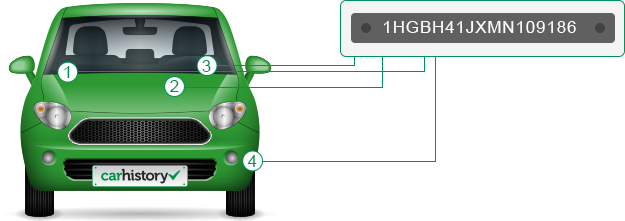
The vehicle identification number (VIN) is composed of 17 characters (digits and capital letters) that act as a unique identifier for the vehicle. A VIN displays the car's unique features, specifications and manufacturer.
The VIN can be found in a couple of places including on the car's registration label (1), on the compliance plate in the engine bay (2) or on the passenger side windshield (3), or on one of the door posts (where the door latches when it is closed) (4). See the image below:
There are certain rites of passage that come with being a teenager, from breakouts to first make-outs and, if they're lucky, their first car. Part-time jobs are a great way to encourage your kids to support some of their interests and hobbies with their hard-earned cash, as well as teaching them about saving up for important purchases.
Once young drivers have proven they are ready to handle the road on their own and been awarded their licence at long last, they may even be able to cut down the hours you've been spending running them around to after-school activities by taking themselves.
As with any significant purchase, you'll want to set a precedent for future decisions by making sure your child does things the right way. When it comes to buying a used car, this means gathering as much information as possible and doing your research.
Fortunately, for teenagers who may roll their eyes at the prospect of yet more homework, you can break the good news that getting a CarHistory report is quick and painless. By simply submitting a car's Vehicle Identification Number (VIN), you can find out important things about a vehicle's background.
A CarHistory report includes a PPSR certificate which is also important to ensure that there is no financial encumbrance (previous debt) associated with a car that could cause it to be repossessed - a lesson you don't want your kids to learn the hard way.
Ah, that old chestnut. It really depends on your family situation, as well as the main motivation for adding another car to the household. According to a survey conducted by Autotrader, it appears that parents are more likely to be dishing out the cash when it comes to their childrens' first car.
The survey found that only 17 per cent of adult respondents reported their children had purchased their own cars, while 41 per cent had bought their child's first car for them1.
"Parents surveyed said their primary motivation for making the purchase was to give them more control over what their children are driving," reported Autotrader. "The secondary reason was because they felt an obligation to help their children."1
Whether you are taking full, partial or even no financial responsibility for your teenager's new ride, make sure you help to guide them towards a safe, reliable choice by getting the information you need from CarHistory.
1Autotrader, Parents More Likely To Purchase Child's First Car. Accessed May 29, 2015